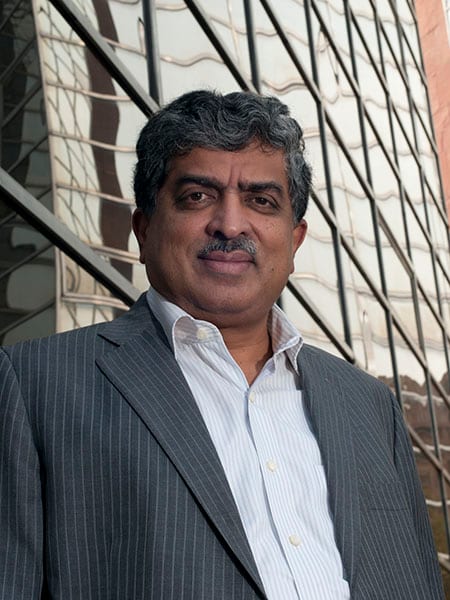Technology must benefit all, else expect a backlash: Nandan Nilekani
Governments must provide the "minimalist infrastructure" of the kind that allows both private enterprise and public good to flourish, he says



Photo: Amit Verma
Emerging technologies such as Artificial Intelligence (AI) must be harnessed strategically in national building to provide equal access to opportunities to all, Nadan Nilekani, the former chairman of India’s Unique ID Authority, said during a conference in Bengaluru on Monday. Failure to do so will invite a backlash, Nilekani warned, as large numbers of people see themselves being left out with the fruits of technological advancement benefiting only a few.
“How do we use all this stuff that you guys have built and flip it around to benefit large numbers of people, and I think that is very important,” Nilekani said in a discussion with Satya Nadella, CEO of Microsoft Corp, at a conference on Artificial Intelligence organised by the company. “If we don’t do that, I think the backlash, as we’ve seen in the US, is going to be quite a lot.”
Nilekani wasn’t available for a follow-on discussion, but he was probably referring to many more Americans voting for Donald Trump — helping Trump become their president — than any pundits had anticipated, as they feared that his opponent Hillary Clinton represented the elite.
The same fears apply in India as well, Nilekani pointed out, and added that the role of the government would be to wisely provide the kind of “minimalist infrastructure” on top of which both private enterprise and public good could flourish — this was the aim behind the Aadhaar project, he said. Aadhaar, which now has enrolled a billion Indians, started with the ID and has now facilitated the world’s first inter-operable mobile-based payments system.
“When you think about the challenge of taking a country with $2,000 per capita to $20,000, then it’s really a major, major transformation. And you really have to fix basic things like health, education and financial services,” Nilekani said.
The classical way of doing that would have been to say ‘Let’s have more doctors, let’s have more hospitals, let’s have more, whatever’. That’s not possible in the time frame that we have. If we have to get everyone educated, and if we take 25 years to do it, then they’ll all be adults,” he said.
This is where technologies such as Artificial Intelligence, machine learning and other internet-based tools come in very handy, he said. They can combine to provide access to a host of services to very large numbers of people at very low costs. If they are used to deliver “personalised” health, education and financial services to a billion people, that will in turn help raise the economy as well, he said.
Nilekani spoke briefly about his next effort, EkStep, which is a non-profit attempt to address the problems of access to learning material for all children. EkStep is a mobile-internet-based, open, education platform for early childhood education. It is a combination of internet-based tools that teachers can use to build customised lessons and a platform that aggregates all such efforts so that anyone can tap it to help children learn.
“How do we get 200 million children learn using AI, smartphones and machine learning and give them learning outcomes on the phones, so that a child in a village has the same access to learning material as someone in a city,” Nilekani said.
Deeper penetration of smartphones and other mobile devices in India, in parallel with growing access to the internet, is slashing the cost of access to useful services in unprecedented ways — for governments and citizens, businesses and consumers and in the case of EkStep, teachers and students.
Nilekani started EkStep in 2015 with his wife Rohini — who has backed non-profits in areas from water and sanitation to education — and Shankar Maruwada, an entrepreneur. Rohini Nilekani is a director at EkStep and Maruwada is its CEO.
EkStep is growing to become a network of many interested parties, from schools to software developers. And since it prescribes how lessons have to be built, and offers the relevant tools, it gets to control the quality of the content available on its platform. At the heart of EkStep is the ability to create stories, worksheets, collections and games to teach children various subjects. Individual teachers can ask for ‘creator rights’ on EkStep, log on, and get started.
They have the option of both using existing lessons already on the platform to start teaching, or build their own lessons using the tools available on EkStep — an authoring tool, for instance. EkStep also provides several useful tutorial videos that teachers can use to improve how they use EkStep.
An important feature of EkStep is that teachers get to create lessons in a local language of their choice, improving the chances that children will benefit as they will be taught in their own languages.
First Published: Feb 20, 2017, 03:30
Subscribe Now